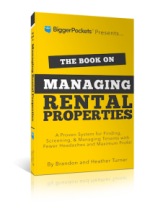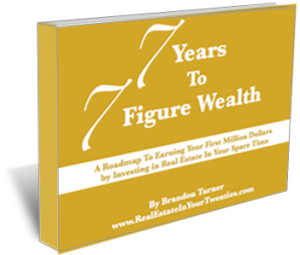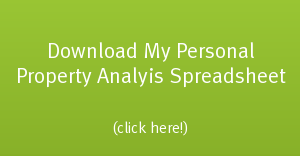Real estate investors disagree on many topics, but one that nearly all agree on is the necessity of investing in yourself. There are literally thousands of books out there that deal with real estate investing, and I’ve probably read most of them! The following list is the top of my top. Without further suspense, I give you my Top Books For Real Estate Investors:
The Best Books for Real Estate:
The Book on Rental Property Investing by Brandon Turner
 Cash flow and wealth don’t happen overnight. But if you are willing to work hard and invest smart, this book is designed to help you achieve your financial goals through the power of rental properties! This book will give you practical, real-world advice for those looking to build wealth and cash flow through rental properties! You’ll learn:
Cash flow and wealth don’t happen overnight. But if you are willing to work hard and invest smart, this book is designed to help you achieve your financial goals through the power of rental properties! This book will give you practical, real-world advice for those looking to build wealth and cash flow through rental properties! You’ll learn:
You’ll learn:
- Why Many Real Estate Investors Fail (And the mindset, processes, and systems you’ll need to succeed.)

- Numerous Easy-to-Follow Strategies (Gurus love to tell you about some single “secret” method to build wealth. Instead, you’ll learn numerous!)
- Finding Deals, Financing Properties, Management, and More. (This comprehensive guide will give you exactly what you need to get your first, or next, rental property.)
You can get this book alone on Amazon, or get it on BiggerPockets and get $500 of bonuses FREE including The Book on Managing Rental Properties!
The Unofficial Guide to Real Estate Investing by Spencer Strauss
 Simply put, this book is amazing. From making a plan, buying your first property, fixing things up, managing property, to selling for premium prices – it’s all here. This book was the inspiration for the real estate strategy that I used in my life to grow my portfolio, and also the inspiration for my other short (free) book “7 Years to 7 Figure Wealth” which you can get for free later on this list!Overall, this book is an excellent summary of the whole process of buying an investment property.
Simply put, this book is amazing. From making a plan, buying your first property, fixing things up, managing property, to selling for premium prices – it’s all here. This book was the inspiration for the real estate strategy that I used in my life to grow my portfolio, and also the inspiration for my other short (free) book “7 Years to 7 Figure Wealth” which you can get for free later on this list!Overall, this book is an excellent summary of the whole process of buying an investment property.
Rich Dad Poor Dad by Robert Kiyosaki
 There may be a lot of hype and motivational talk in this book (not to mention the Rich Dad marketing machine you see everywhere), but this classic among investors contains an unbelievable amount of life-changing, thought-provoking content. Rich Dad is all about opening our minds to the possibilities of letting our money earn money, rather than our time. Kiyosaki does an excellent job of putting to words what I had been feeling in my heart for a long time.
There may be a lot of hype and motivational talk in this book (not to mention the Rich Dad marketing machine you see everywhere), but this classic among investors contains an unbelievable amount of life-changing, thought-provoking content. Rich Dad is all about opening our minds to the possibilities of letting our money earn money, rather than our time. Kiyosaki does an excellent job of putting to words what I had been feeling in my heart for a long time.
Rich Dad’s ABC’s of Real Estate Investing and Rich Dad’s Advanced Guide to Real Estate Investing by Ken McElroy.

These are two books that work as a team to teach one huge method of investing in real estate – multifamily investing. These two are the best books on “big picture” real estate investing through apartments I’ve read.
If you want to start making serious money in real estate, check these two books out. Also, these books contain the best descriptions and examples of harnessing the power of cap rates while investing in real estate.
The Book on Investing in Real Estate with No (and Low) Money Down by Brandon Turner
 Looking to get started using other people’s money? Struggling to find out how to pay for your first (or next) property? This is the one book on this list you CAN’T afford to miss (see what I did there?!) Usually the term “no money down” is synonymous with the late night TV gurus with big hair, big smiles, and big promises – but this book is different. It’s not about one “secret” strategy – it’s about numerous strategies used by real investors in today’s market – both newbies and advanced. Of course I’m a little biased on how awesome this book is – because I wrote it, but being one of the top real estate books on Amazon definitely validates my bias!If you want to pick up a copy of this (either digital, physical, audio – or all three) head over to BiggerPockets.com/nomoney and get it!
Looking to get started using other people’s money? Struggling to find out how to pay for your first (or next) property? This is the one book on this list you CAN’T afford to miss (see what I did there?!) Usually the term “no money down” is synonymous with the late night TV gurus with big hair, big smiles, and big promises – but this book is different. It’s not about one “secret” strategy – it’s about numerous strategies used by real investors in today’s market – both newbies and advanced. Of course I’m a little biased on how awesome this book is – because I wrote it, but being one of the top real estate books on Amazon definitely validates my bias!If you want to pick up a copy of this (either digital, physical, audio – or all three) head over to BiggerPockets.com/nomoney and get it!
The Four Hour Workweek by Tim Ferriss
 While not about Real Estate at all, The Four Hour Workweek is still an excellent book on living outside the “status quo” of slave, save, retire, die. It transformed the way I look at the world, retirement, money, etc. I recommend this book to almost every person in any field.
While not about Real Estate at all, The Four Hour Workweek is still an excellent book on living outside the “status quo” of slave, save, retire, die. It transformed the way I look at the world, retirement, money, etc. I recommend this book to almost every person in any field.
might be turned off by Ferriss’ “personality” and bravado but I find the information and motivation invaluable. If you are feeling overwhelmed by life and the busyness of it, don’t skip this one. I think you’ll like it.
Landlording on AutoPilot by Mike Butler
 Mike Butler’s book is hands down the best book on being a landlord for single family homes. There is so much good information in this book about dealing with tenants it is insane. This single book helped me dramatically to improve my landlording business and make my business so much
Mike Butler’s book is hands down the best book on being a landlord for single family homes. There is so much good information in this book about dealing with tenants it is insane. This single book helped me dramatically to improve my landlording business and make my business so much
If you are struggling at all with being a landlord or fearful of jumping into real estate because of the thought of being a landlord, read this book.
Other Great Real Estate Books: Honorable Mentions
BiggerPockets.com
Okay, Bigger Pockets may not be a physical book. It’s actually the world’s largest real estate community. However, anything you could ever learn in a book is found on this site. Tons of investors, lots of info, amazing stuff. Really, this site taught me a lot about real estate investing. Now I am one of their contributors to their blog (which is super-duper cool). Seriously any question you have about rea estate (besides asking me, which you totally can and should!) you can ask in the forums and you’ll get a bazillion seasoned real estate investors to answer you. It’s a living book. I love it.
 7 Years to 7 Figure Wealth by … me!
7 Years to 7 Figure Wealth by … me!
Ok, it’s a shameless plug, but I had to include this book in the list! If you want to check it out, it’s 100% free and you can download it right now. This book is a complete summary of my investment strategy and one avenue to earn a million dollars in real estate purchasing only five properties in seven years with almost no money.
What Every Real Estate Investor Needs to Know about Cash Flow… And 36 Other Key Financial Measures by Frank Gallinelli. This book is about math, and making that math easy. If you don’t understand the principles discussed in this book, you will never be successful in real estate or any business, period. If you want to understand it fully, devour this book and keep it on your shelf. This is definitely not a “check out from the library” sort of book. (Also, read “The Buy and Hold Guys'” interview with Frank Gallinelli here)
Investing in Duplexes, Triplexes, and Quads: The Fastest and Safest Way to Real Estate Wealth by Larry Loftis. This book, as the title suggests, is my favorite book dealing with small multifamily properties. Being one of the first investment books I read, it really opened my eyes to what is possible out there, and caused me to buy my first duplex – which still brings me almost $400 per month in cashflow. I owe that purchase and success to this book. If you are just starting out, I highly recommend this book.
 Set For Life by Scott Trench. Scott is a great friend of mine and one of the smartest people I know. He wrote this FANTASTIC book that anyone under the age of 40 needs to read. Like… right now. Seriously – it’s life changing. It’s all about how to set up your life so you can achieve financial freedom sooner than you’d ever imagine. Part real estate, part personal finance, part motivation, and 100% awesome. Read it.
Set For Life by Scott Trench. Scott is a great friend of mine and one of the smartest people I know. He wrote this FANTASTIC book that anyone under the age of 40 needs to read. Like… right now. Seriously – it’s life changing. It’s all about how to set up your life so you can achieve financial freedom sooner than you’d ever imagine. Part real estate, part personal finance, part motivation, and 100% awesome. Read it.
How to Manage Residential Property for Maximum Cash Flow and Resale Value – By John T Reed. This hard-to-find book (he doesn’t sell on Amazon – just on his website) is really like an encyclopedia on managing large multifamily properties. Known for his straight-forward, no-fluff attitude, Reed has thousands and thousands of tips on managing larger properties. I re-read this book at least twice a year and learn new things every time. I have not (yet) read his other real estate books, but if they are anything like this one, they will be amazing.
[FREE] 20 Ways to Buy a House for $2,000 or Less – Written by Ben Leybovich, and 100% FREE for you to read, this book contains a TON of great suggestions for buying real estate using other people’s money. In a way, this was the book that inspired me to write “The Book on Investing in Real Estate with No (and Low) Money Down.” In addition to this free book, Ben offers a ton of other great content for free, so be sure to download all his free content.
***Update – Check out the sequel to this post titled, “Seven MORE Must Read Books for Real Estate Investors” ***
What are your favorite real estate investing books? List them in the comments below!
P.S. looking for hard money loans in California? Be sure to check out my friends over at northcoastfinancialinc.com. They have very competitive rates, can fund within a week and specialize in fix and flip loans and other hard money loans.

 If this is your first time here at Real Estate In Your Twenties.com - welcome!
If this is your first time here at Real Estate In Your Twenties.com - welcome! 





